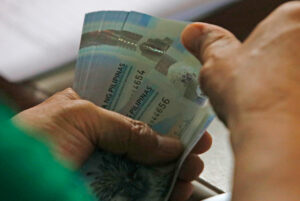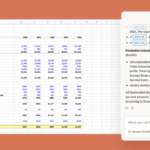
The peso on Monday recorded its weakest close against the dollar so far this year after a monetary board member signaled further easing to help the Philippine economy cushion the blow of a growing corruption scandal on growth prospects.
The local unit fell 27.5 centavos to close at P58.90 against the greenback from its P58.625 on Friday, extending its decline to the eighth consecutive session, data from the Bankers Association of the Philippines showed.
This was a more than 10-month low for the peso as it was its worst closing since the P59 ended at its record low on December 19, 2024.
The peso opened slightly stronger against the dollar at P58.60 in Monday's session. It climbed to a high of P58.50, while its weakest performance against the greenback was at P58.92.
Dollar exchange increased from $1.39 billion on Friday to $1.6 billion on Monday.
Amid growth concerns, the peso sank on Monday after reprehensible comments by Bangko Sentral ng Pilipinas (BSP) policy-making monetary board member Benjamin E. Diokno, the first trader said in a Viber message.
“The pair closed higher on a weaker peso due to statements by former BSP governor Diokno in which he said he sees more easing this year, along with demand for the dollar on expectations of a stronger US-China trade deal,” another trader said in a phone interview.
Rizal Commercial Banking Corp. chief economist Michael L. “Local market sentiment has been partly affected by political noise in recent weeks, which may distract from the economy and reforms,” Ricafort said in a Viber message.
The Philippine central bank may cut its key interest rate in December and again next year as the economic fallout from the corruption scandal could last until the end of 2026.FIsial said, Bloomberg reported.
“I would expect a 25 basis point cut at the next meeting in December,” Mr. Diokno said in an interview with Bloomberg Television's Avril Hong on Monday.
According to Mr. Diokno, further rate cuts “probably sometime next year” are possible as policymakers assess economic growth and employment data, with inflation under control.
The BSP cut its benchmark interest rate by a quarter point this month as a corruption scandal in government flood control projects threatens the country's economic outlook. Its next rate-setting meeting is scheduled for December 11.
Mr Diokno, who once headed the central bank as well as the finance and budget portfolios, said the economy may slow down “a little” due to the corruption controversy and trade uncertainties. He said 2026 would be “a transition period” as President Ferdinand R. Marcos, Jr. will solve the problem.
In July, Mr. Marcos exposed corruption in flood-control projects worth billions of pesos. Many projects were either substandard or non-existent, leading the investigation to include major public worksFOfficials and many lawmakers have denied wrongdoing. These allegations led to a massive exit from the stock market by foreign investors.
“We will probably be able to recover from this mess by the end of next year. And in 2027 and 2028, we will be back on track,” Mr. Diokno said.
For Tuesday, the first trader said the peso could take profits and rebound ahead of an expected rate cut by the US Federal Reserve.
The first trader and Mr. Ricafort both see the peso rising to between P58.75 and P59 per dollar on Tuesday, while the second trader expects it to remain between P58.60 and P58.90. , AMC Sy with bloomberg










